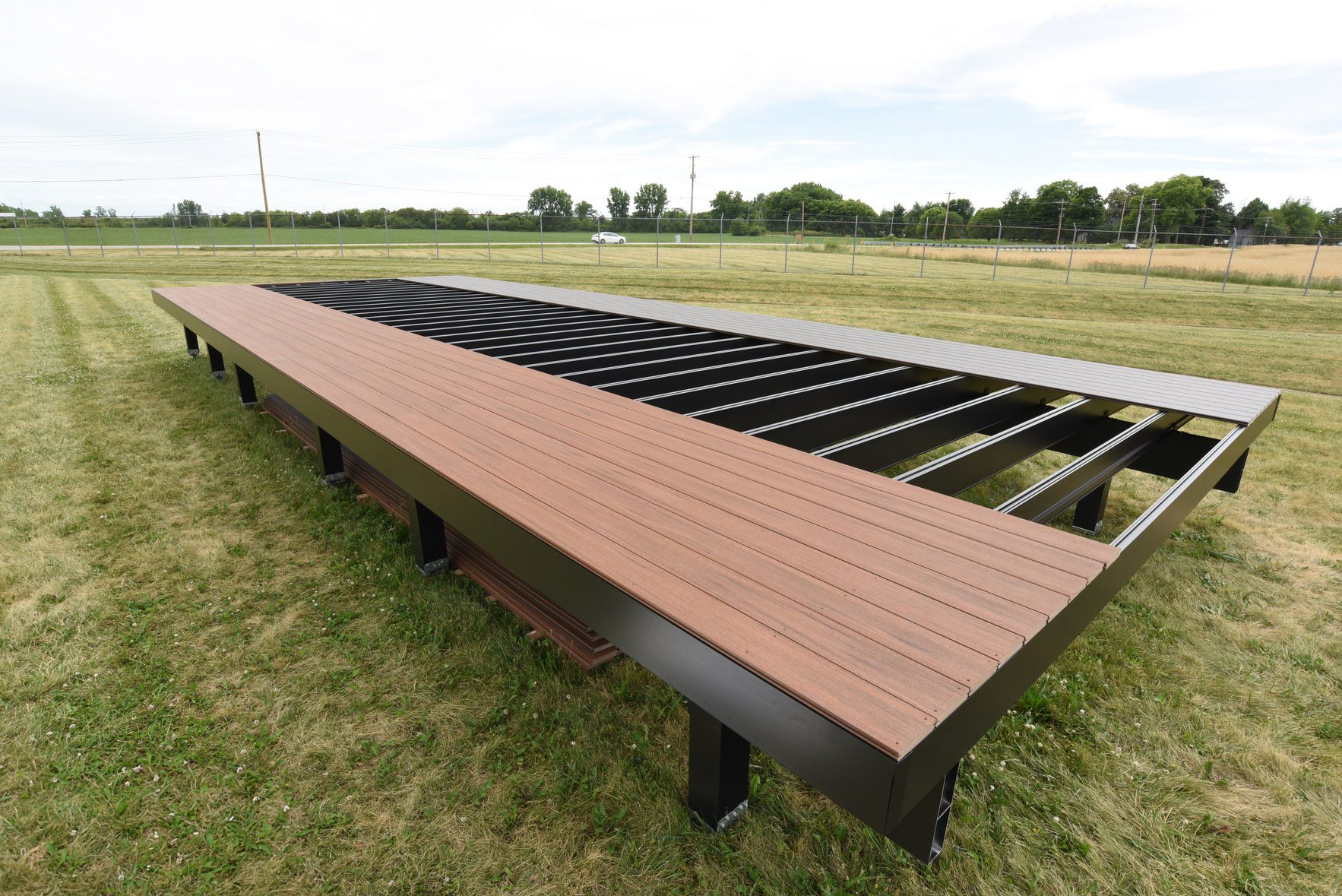When building a new deck, homeowners typically spend a lot of time selecting decking materials—whether to go with hardwood, composite, or PVC decking. However, the framing that supports your deck is equally important. Traditionally, pressure-treated lumber has been the default choice for deck framing.
But today, more homeowners are exploring alternatives like aluminum deck framing, which offers durability, versatility, and specific benefits over wood and even steel framing. Here’s why aluminum deck framing is worth considering for your next project.
The Downsides of Pressure-Treated Lumber Framing
Pressure-treated lumber has been the go-to material for deck frames for decades due to its affordability and resistance to termites and decay. However, newer formulas for pressure treatment have not held up as well over time.
Many homeowners find that, despite treating the lumber, it can rot or decay within just ten years. This lifespan, especially for elevated or high-traffic decks, often doesn’t provide the long-term reliability that homeowners desire.
Moisture infiltration, ground contact, and continuous exposure to weather can significantly degrade pressure-treated lumber, requiring replacement much sooner than other framing materials.
Aluminum: A Durable, Rot-Free Alternative
Unlike wood, aluminum is completely resistant to rot, decay, and termites, which can destroy traditional deck framing over time. Aluminum deck framing is designed to endure years of exposure to the elements without suffering from the wear and degradation typical of wood.
Additionally, aluminum will not warp, twist, or shrink over time—qualities that are often seen in wood framing due to changes in moisture and temperature.
Choosing aluminum for your deck frame can mean a foundation that can last as long as the deck boards themselves, reducing the need for costly frame repairs or replacements. It is also more resilient against impact, meaning it can support larger loads without bending or breaking.
Aluminum is Suitable for Coastal Areas
For homeowners near the coast, corrosion resistance is a critical factor to consider when choosing framing materials. Saltwater is notoriously damaging to both wood and even certain metals. Steel deck framing, while strong, is generally not recommended for areas close to seawater, as salt corrosion can reduce its longevity and compromise its strength.
Aluminum, on the other hand, has a natural resistance to corrosion and can withstand saltwater exposure without degradation. This makes aluminum deck framing an excellent choice for coastal decks that experience consistent exposure to salt and moisture.
Aluminum Deck Framing in Wildland-Urban Interface (WUI) Areas
For those in wildfire-prone areas, building regulations often require specific materials that are less flammable and more resistant to high temperatures.
Aluminum is non-combustible and meets the requirements for building in Wildland-Urban Interface (WUI) areas. Choosing aluminum framing helps make decks safer in these regions, as it won’t fuel a fire or melt under high heat, providing greater peace of mind and compliance with local building codes.
Lightweight and Easy to Install
Aluminum deck framing is notably lighter than steel, making it easier to handle during the building process. It’s easy to install with standard carpentry tools, and the lighter weight can also mean fewer people are needed to move and position materials.
This reduced weight makes it an excellent choice for elevated decks, where ease of installation can be a critical factor in both safety and efficiency.
Superior Strength and Stability
Aluminum deck framing systems are engineered for strength, designed to support heavier loads than traditional wood frames without bending, warping, or shifting.
This structural integrity is particularly beneficial for large decks, hot tubs, or outdoor kitchens, where additional weight and vibration are common. Aluminum’s rigidity also means that it provides a consistently level surface for your decking, maintaining a solid and stable platform for years to come.
A Green Option for Eco-Conscious Homeowners
Aluminum is one of the most recyclable metals, and many aluminum framing systems are made from recycled material. Opting for aluminum framing is a greener choice that reduces the environmental impact of your deck’s construction and minimizes waste. It’s a win-win for homeowners looking to build sustainably without compromising on quality.
Initial Cost vs. Long-Term Value
While aluminum deck framing comes at a higher initial cost than pressure-treated lumber, its benefits translate to significant long-term value. Given its durability and low-maintenance nature, you’ll likely save money over time by avoiding frequent repairs, replacements, or maintenance that wood framing requires.
By investing in aluminum framing, you’re investing in a frame that will likely outlast multiple generations of deck boards.
Is Aluminum Deck Framing Right for Your Deck?
Choosing aluminum deck framing is an excellent choice for homeowners seeking a deck that combines durability, stability, and minimal maintenance. From coastal environments to WUI zones and for those looking to build sustainably, aluminum framing offers multiple advantages over both wood and steel.
With a lifespan that can match the deck boards above it, an aluminum frame helps create a deck that you and your family can enjoy for many years with little worry.
So, when considering framing materials for your new deck, remember that aluminum deck framing isn’t just an option; it’s an investment in a long-lasting, rot-free, corrosion-resistant foundation that truly stands the test of time.
